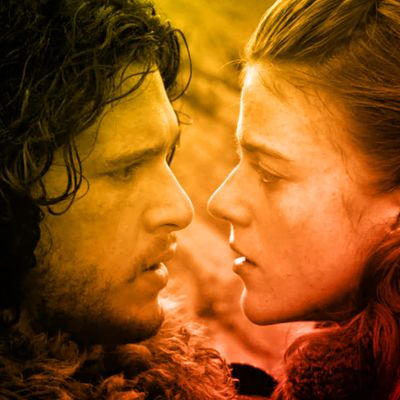
WeÔÇÖre only halfway through the season, and itÔÇÖs only May, but itÔÇÖs already hard for me to imagine any show topping Game of Thrones on my 2013 year-end best-of list. There are more innovative and original series, but none that satisfies on so many levels, or that juggles so much plot and so many characters with the appearance of ease.
Since HBOÔÇÖs blockbuster adaptation of George R.R. MartinÔÇÖs fiction debuted in 2011, many have lodged complaints about the showÔÇÖs racial stereotypes and simplistic sexual dynamicsÔÇöand rightly so; Thrones was a problematic series and still is, despite course corrections that suggest showrunners David Benioff and D.ÔÇàB. Weiss heard their critics. Beyond that, however, the show doesnÔÇÖt get enough credit. Nearly a decade after ┬¡Peter Jackson won Oscars for a film ┬¡series about wizards and hobbits, fantasy is still seen as disreputable nerd bait rather than a legitimate mainstream genre. That should change this year, and if it doesnÔÇÖt, fans can cry foul. Thrones was always solid and sometimes awesome, but its third season represents a giant leap forward in ambition and execution. ItÔÇÖs equal or superior to any big-screen fantasy picture you can name, including John BoormanÔÇÖs Excalibur and the Lord of the Rings trilogy, and as wise about the intersection of friendship, family, and power as the Godfather films.
Its achievements are all the more remarkable when you consider the degree of difficulty involved. Thrones is one of the most expensive series in TV history. And itÔÇÖs based on books with a large, loyal following; it has to split the difference between honoring the text while making it accessible to a wide audience and reserving the right to change things for sophisticationÔÇÖs sake. It does all this while following dozens of major characters, highborn and lowborn, through plots and counterplots, alliances and betrayals, attacks and retreats, still managing to communicate every characterÔÇÖs eccentricity and humanity and never devolving into a three-dimensional flowchart with actors.
It does all these things without breaking a sweat, and its mastery of classical visual storytelling is the wellspring of its strength. ThronesÔÇÖ filmmaking is direct and clean, balancing efficiency and beauty, but every now and then it throws in a dazzling visual flourish: a majestically slow pan following a crack as it spreads across the icy Wall, unleashing an avalanche; a Gone With the WindÔÇôstyle pullback that frames lovers Jon Snow (Kit Harrington) and Ygritte (Rose Leslie) against a verdant valley; a tormented prisonerÔÇÖs castration obscured by a sudden loss of screen focus that turns the frame into a collage of pulsing, bruiselike splotches; the cut-to-black that ends ÔÇ£Walk of Punishment,ÔÇØ a shot lopped off as brutally as the sword hand of Jamie Lannister (Nikolaj Coster-Waldau); an overhead shot of a young dragon flamb├®ing the man who stupidly thought that he owned it like a pet. (The showÔÇÖs creature effects are Spielberg-worthy, particularly the dragons, who have as much personality as Jurassic ParkÔÇÖs velociraptors; you donÔÇÖt just watch them move and react, there are times when they seem to be thinking.) The showÔÇÖs ability to hopscotch among multiple ongoing subplots is exemplary as well. At its aesthetic peak in episode sevenÔÇöa classic hour of TV, adapted by Martin and directed by Breaking Bad veteran Michelle MacLarenÔÇöthe show reminded me of film critic James AgeeÔÇÖs description of the end of D.ÔÇàW. GriffithÔÇÖs Intolerance: ÔÇ£the intercutting, at the climax of that picture, between the climaxes of four parallel stories, like the swinging together of tremendous gongs.ÔÇØ
And yet for all its comfort in the spectacular, ThronesÔÇÖ most effective moments are much more intimate. TheyÔÇÖre about characterization and feeling: ┬¡people lying to one another or confessing difficult truths, hedging bets or taking risks, imparting wisdom or misdirection, all the while behaving like messily complex human beings rather than ┬¡ciphers in flowing gowns or clanking chain mail. Think of Daenerys Targaryen (Emilia Clarke) telling the former slave turned unit commander Grey Worm (Jacob Anderson) that he can choose his own name now, and Grey Worm replying that heÔÇÖd rather keep the name he had when Daenerys set him free. Think of the still-fugitive Arya Stark (Maisie Williams) rejecting a warriorÔÇÖs hard sell about the glories of the Red God and coldly telling him, ÔÇ£The one true god is death.ÔÇØ Think of JamieÔÇÖs monologue in the bath with Brienne about the events that gave him his nickname Kingslayer and the way his strong voice becomes more unaffectedly helpless as he talks, until he finally loses the last shreds of his vanity and falls back in her arms, sobbing like a child. Think of the teasingly earthy warriors-in-love banter between Jon and Ygritte, particularly YgritteÔÇÖs version of a hearts-and-flowers declaration: ÔÇ£If you rip my pretty silk dress, IÔÇÖll blacken your eye.ÔÇØ Think of Peter ┬¡DinklageÔÇÖs Tyrion Lannister telling his beloved girlfriend Shae (Sibell Kikelli) that heÔÇÖs been ordered to marry Sansa Stark (Sophie Turner) for the dynastyÔÇÖs sake; as he says ÔÇ£This is duty, not desire,ÔÇØ his eyes cloud a bit, and you can almost hear his heart breaking in his chest. He calls her ÔÇ£miladyÔÇØ and she replies, ÔÇ£I am not your lady.ÔÇØ ÔÇ£You are,ÔÇØ he insists. ÔÇ£You will always be my lady.ÔÇØ He and she and we all know it isnÔÇÖt true.
These and so many other moments are emotional but not sentimental; theyÔÇÖre tough, in the way that life is. ThronesÔÇÖ characters are in a constant struggle for survival, trying to balance the requirements of family and nation against their own oft-thwarted desires and get through each day with their heads still attached to their necks. They scheme and compromise, and love and suffer, and we can see ourselves in all of them, heroes and fools alike. Game of Thrones is set in a fantastical universe, a land of dragons and zombies and giant wolves and fire demons, but itÔÇÖs the realest show on TV.
Game of Thrones. Sundays. HBO. 9 p.m.
*This article originally appeared in the May 27, 2013 issue of New York Magazine.


